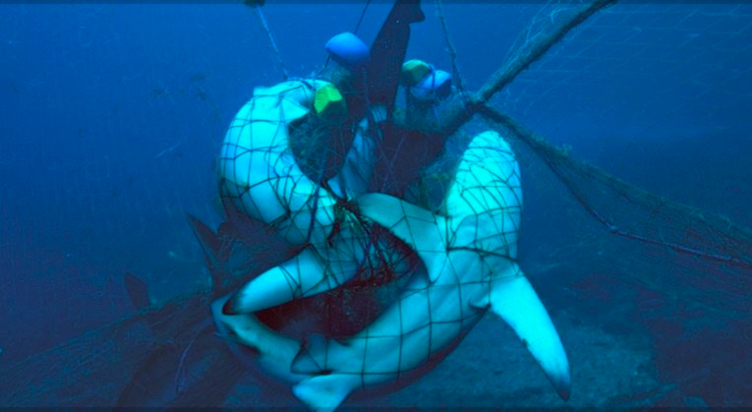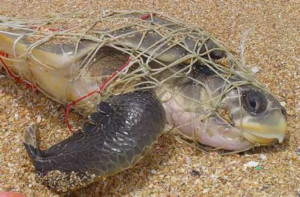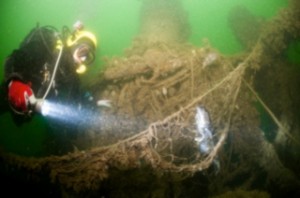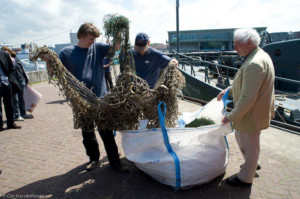Marine Life & Conservation
Ghost Fishing

In a way the term Ghost Fishing almost has a sci-fi/adventure feel to it and does little to portray the great horror and devastation it actually inflicts on the marine environment around the world. The first I ever new about Ghost Fishing was back in the 1980’s when I joined the Sea Shepherd Conservation Society to make a film for UK television about the Drift Net fisheries in the North Pacific for Tuna and salmon. At that time, the combined Japanese and Taiwanese fishing fleets were laying approximately 20,000 miles of drift net at any one time. Each net being up to 30 miles long and 100 feet deep, drifting on the ocean currents catching everything that came in their path.
As well as the targeted catch of Tuna, the bi-catch was of unimaginable quantities. Everything perished – Whales, Dolphins, Turtles, Seals, Sea Birds, Sharks and many species of pelagic fish.
Many of these nets were lost at sea and continue to ‘fish’ until the shear weight of the catch would drag them to the sea bed. But this was not the end of the nets’ fishing life. On the sea bottom the nets continue to entangle marine life until one day the ‘catch’ would decompose enough to allow the nets to once again rise to the surface and begin the whole process over again.
Those nets are still out there. It is not just mono-filament nets that cause ‘Ghost Fishing’ problems. Any lost or discarded fishing tackle will take its toll. The problem continues.
There is a Dutch group who are trying to tackle the problem. The article below is written by Pascal van Erp, one of the directors of www.ghostfishing.org
Ghost Fishing is what fishing gear does when it has been lost, dumped or abandoned. Imagine a fishing net that gets snagged on a reef or a wreck and gets detached from the fishing vessel. Nets, long lines, fish traps or any man made contraptions designed to catch fish or marine organisms are considered capable of ghost fishing when unattended, and without anyone profiting from the catches, they are affecting already depleted commercial fish stocks. Caught fish die and in turn attract scavengers which will get caught in that same net, thus creating a vicious circle.
Ghost nets are among the greatest killers in our oceans, and not only because of their numbers. Literally hundreds of kilometers of nets get lost every year and due to the nature of the materials used to produce these nets, they can and will keep fishing for multiple decades, possibly even for several centuries.
When caught on a reef, nets do not only catch fish, turtles, crustaceans, birds or marine mammals, they also destroy hard and soft corals, wiping out complete ecosystems while swaying in the current. If caught on wrecks nets can suffocate a wreck and thereby render hiding places for marine life useless, or even trap them inside.
 Divers are all too familiar with this phenomenon, especially in well fished areas. The founders of Ghost Fishing were confronted with ghost nets while diving the many wrecks in the Dutch North Sea. In 2009 they joined a local team of divers who started to clean those wrecks. After some years of local efforts it was time to broaden the horizon and get in touch with like-minded groups all over the world. And so the Ghost Fishing foundation was born. As of March 2013, Ghost Fishing is collaborating with 14 teams worldwide to work on existing projects, set-up new ones and document these through visual media, educating divers, informing a wide audience and raising social awareness. The Foundation exchanges solutions and best practices and maintains a steady stream of information through social media, and a website that offers extensive information and possibilities for interaction.
Divers are all too familiar with this phenomenon, especially in well fished areas. The founders of Ghost Fishing were confronted with ghost nets while diving the many wrecks in the Dutch North Sea. In 2009 they joined a local team of divers who started to clean those wrecks. After some years of local efforts it was time to broaden the horizon and get in touch with like-minded groups all over the world. And so the Ghost Fishing foundation was born. As of March 2013, Ghost Fishing is collaborating with 14 teams worldwide to work on existing projects, set-up new ones and document these through visual media, educating divers, informing a wide audience and raising social awareness. The Foundation exchanges solutions and best practices and maintains a steady stream of information through social media, and a website that offers extensive information and possibilities for interaction.
Collecting ghost nets is also part of a broader mission in which The Foundation works towards sustainable recycling of the nets, which will be used as raw material for new products.
The Ghost Fishing Foundation was started as a non-profit organization in November 2012 and has already presented itself at the Hylkesukelus 2013, a wreck diving seminar in Helsinki, Finland and Duikvaker 2013 in the Netherlands where the message was well received and many valuable contacts were made. The next event will be Baltictech Conference 2013 in Poland where the most recent material of our work will be shown.
In 2013 we hope to participate in clean-up work in Krnica, Croatia, Portofino, Italy and if funding permits more plans will be set-up and executed.
As marine debris is rapidly becoming a greater problem, it is imperative to take real action as soon as possible. Ghost Fishing intends to collect funds to finance clean-ups, to sponsor gear, to train divers and to raise public awareness.
If you would like to know more or start your own project visit http://www.ghostfishing.org/
Marine Life & Conservation
Paul Watson Released as Denmark Blocks Japan’s Extradition Bid

Renowned anti-whaling activist Paul Watson has been released from custody in Greenland after spending five months in detention. Denmark’s Justice Ministry rejected Japan’s request for his extradition, citing insufficient guarantees that his time already served in custody would be credited against any potential sentence.
The 74-year-old Canadian-American was arrested on July 21 in Nuuk, Greenland’s capital, when his ship docked to refuel. His arrest was based on a 2012 Japanese warrant related to a 2010 encounter in Antarctic waters. Japan alleged Watson obstructed operations and caused damage to a whaling research ship during efforts to disrupt illegal whaling. Watson has consistently denied these claims, maintaining his commitment to marine conservation.
Denmark, which oversees extradition matters for Greenland, concluded that while the legal conditions for extradition were met, the lack of assurances from Japan regarding time-served credit made extradition untenable.
In a video shared by his foundation, Watson expressed gratitude and relief, saying, “After five months, it’s good to be out… and good to know they’re not sending me to Japan.” He added that the most difficult part of his time in custody was being separated from his two young sons.
Watson is a pioneering figure in marine conservation, known for founding the Captain Paul Watson Foundation in 2022 after decades of activism with the Sea Shepherd Conservation Society. His bold efforts to defend marine life have earned him widespread support, including from celebrities and conservationists. His work has also been featured in the acclaimed reality TV series Whale Wars.
Watson’s lawyer, Jonas Christoffersen, praised the decision, stating, “We are happy and relieved that Paul Watson is now free.” He added that Watson is eager to reunite with his family and continue his vital work.
The arrest occurred while Watson’s vessel, the M/Y John Paul DeJoria, was en route to the North Pacific with a team of 26 volunteers to intercept a Japanese whaling ship. His foundation described the arrest as politically motivated and emphasized that Watson’s actions were focused on ending illegal whaling practices.
Japan resumed commercial whaling in 2019 after leaving the International Whaling Commission, asserting that whale meat is a cultural tradition. Conservationists, however, continue to challenge these practices, highlighting their impact on marine ecosystems.
Despite the challenges, Watson remains steadfast in his mission to protect marine life and bring attention to whaling practices. His dedication to ocean conservation has made him a globally respected advocate for the environment.
Marine Life & Conservation
12 Days of Zero-Waste Fish-mas

This holiday period, the Marine Conservation Society, the UK’s leading ocean membership charity, invites you to make some simple changes to eating fish this Christmas to help our seas.
Dr Kenneth Bodles, Head of Fisheries and Aquaculture at the Marine Conservation Society, said, “During the festive season, our consumption increases, but so does waste. Sustainability isn’t just about where food comes from – it’s also about how you use it. By reducing waste and making the most out of your seafood, you’re not only taking steps to be more ocean-friendly, but can also help to cut costs during what is often one of the most expensive times of the year”.
The Marine Conservation Society has compiled twelve tips on how to consume seafood sustainably with zero-waste this Christmas:
Buy whole fish instead of fillets
Instead of fillets, consider buying whole fish such as salmon, hake, or lemon sole. By adopting a “nose to tail” approach with cooking, whole-baked fish not only feeds a crowd, but also helps to minimise waste and maximise sustainability by using up every part of the animal, including bones, skin, and fat.
Make fish stock
Leftover fish bones or shells can be put to good use by boiling them to make a nourishing fish stock or bisque. This can be frozen and preserved for later use and makes for a flavourful base in a soup.
Make your own fish pâté
Avoid waste by turning leftover fish, such as smoked mackerel or salmon, into a delicious pâté by blending with cream cheese and lemon. Perfect when paired with crackers.
The sustainability of salmon and mackerel varies depending on where and how it is caught or farmed. For more information on green-rated options, check the charity’s Good Fish Guide.
Buy frozen
By purchasing seafood that is frozen or vacuum-packed, this helps to reduce waste by extending the shelf life of your food.
Fish pie
If you’re wondering what to do with leftover cooked fish, why not opt for a classic fish pie with mashed potatoes, leeks, and a cheesy sauce? A sure crowd pleaser on Boxing Day.
Use the head
Don’t forget the fish head! The meat is incredibly tender and flavourful. The charity recommends a cod’s head curry or recreating Fallow’s renowned cod’s head in siracha butter.
By stretching your ingredients further, not only is this a more sustainable way to enjoy seafood, but also cost-effective by repurposing leftovers and cooking creatively.
Boxing Day brunch
Mix leftover kippers or smoked salmon with scrambled eggs for a tasty, zero-waste, Boxing Day brunch.
For best choice, make sure you buy kippers, or herring, from the North Sea and the North Irish Sea.
Zero-waste storage
A top tip from the Marine Conservation Society to avoid waste is freezing fish offcuts to save for future use.
Crisp up the skin
Even leftover fish skin can be turned into a quick savoury snack by crisping it up in an air fryer with a little olive oil and salt.
Anchovies two ways
Leftover anchovies can either be blended with butter to make a delicious anchovy butter or tossed into pasta for a hit of umami flavour.
The charity recommends opting for anchovies caught in the Bay of Biscay for best choice.
Fishcakes
For an easy, zero-waste meal, leftover seafood trimmings can be mixed with mash and fried in breadcrumbs to make fishcakes.
Pickled mussels
Try pickling mussels in 1:1 vinegar and water, with a dash of sugar for a sustainable, zero-waste snack that can be enjoyed well beyond the festive season.
Mussels farmed in the UK are a seafood superhero. Grown using low-impact methods and harvested by hand, they get all the food they need from the sea around them. This makes them one of the most sustainable, ocean-friendly, and cost-effective seafood options.
Players of People’s Postcode Lottery have raised £6.6M towards the Marine Conservation Society’s vital work in making seafood more sustainable.
Laura Chow, Head of Charities at People’s Postcode Lottery, said: “Fish is a festive favourite for many, but making sustainable choices when it comes to how we buy and eat seafood makes all the difference for our ocean. Support from players of People’s Postcode Lottery has helped the Marine Conservation Society further its sustainable seafood work, so that we can all enjoy healthier, better protected seas.”
The Marine Conservation Society encourages you to make sustainable seafood choices a year-round habit, not just for Christmas. To check how sustainable the seafood on your plate is, you can visit the charity’s Good Fish Guide. The Guide helps consumers and businesses identify the most sustainable seafood using a simple traffic light system, based on where and how species are caught or farmed. Green is the best choice, amber means improvements are needed, and red indicates fish to avoid buying.
Zero-waste gift idea
Why not embrace a zero-waste Christmas by gifting a membership to support marine conservation? It’s a meaningful, low-waste gift that helps protect our ocean for generations to come. Memberships start from as little as £5 a month – the price of a sandwich and drink from your local coffee shop.
Find the latest sustainable seafood advice for wild-caught and farmed seafood on the Good Fish Guide, downloadable to your phone from www.mcsuk.org/goodfishguide.
-

 News2 months ago
News2 months agoIconic SS United States to become the World’s Largest Artificial Reef
-

 News3 months ago
News3 months agoBook Review – 52 Assignments: Underwater Photography
-

 Gear News3 months ago
Gear News3 months agoDYNAMICNORD – New German diving brand enters the British market
-

 News3 months ago
News3 months agoExploring Cenote El Pit: A Diver’s Dream
-

 Gear News3 months ago
Gear News3 months agoTry BARE drysuits (and maybe even win one!) this Friday with Sea & Sea at North West Dive Fest
-

 Marine Life & Conservation3 months ago
Marine Life & Conservation3 months agoBook Review: Coral Triangle Cameos
-

 Blogs2 months ago
Blogs2 months agoDive the Egyptian Red Sea this Autumn with Regaldive
-

 News3 months ago
News3 months ago2024 Ocean Art Underwater Photo Competition Announced















